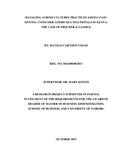| dc.description.abstract | The business environment is going through rapid transformation in this age of
globalization. The number of companies with international operations is increasing since
the world is opening up to foreign firms. Because of these developments, contemporary
firms that operate in the international market have greater challenges than before. This
means that when a firm plans to internationalize, it must be ready to tackle a number of
obstacles such as culture that are predominant in the international environment for it to
achieve success in a foreign market. The aim of this study was to determine across
culture management practices adopted by Procter & Gamble in Kenya. The study
employed a case study research design since it was focusing on Procter & Gamble
multinational company. The case study was considered appropriate since it enabled the
researcher to conduct an in depth investigation on the matter Data was collected from
the Procter & Gamble management level staff. The main instrument for data collection
was the interview guide that allowed for uniformity of responses to questions. The
interview guide was preferred over other methods of collecting data because of their
capability to extract information from the respondents as well as giving the researcher a
better understanding and more insightful interpretation of the results from the study.
Procter & Gamble has expanded its operations to a number of markets within the Asia,
Latin America, North America, Central, Eastern and Western Europe, and Africa. This
expansion is in line with the company’s vision of becoming the preferred producer and
distributor of household and personal care products. Further the study found that culture
had a very significant influence in the expansion of Procter & Gamble international
business. It reveals that culture is a very strong asset in market development in new
markets that the multinational ventures into. The study also concluded that culture had a
very significant influence in the expansion of Procter & Gamble international business.
The main reason for this stems from the fact that culture is actually the foundation of
most of the decisions that the multinational makes. The study recommended that it is
important for firms expanding into the international market to give cross cultural issues
the attention they deserve if they aim to propel business to higher levels of success. | en_US |



